
Tip #1— Wear Sunscreen Every Day, Year-Round
At any age, protecting your skin from the sun's harmful rays is vital, especially if you want to prevent sagging skin or encourage elasticity. "The best medicine for your skin's collagen is prevention, i.e. sunscreen," Casey says. "A broad spectrum (protects from both UVA and UVB rays) sunscreen with SPF 30 or higher prevents the UV rays of the sun from penetrating into your skin and causing collagen and elastic fiber breakdown." Collagen is a type of protein and is the most abundant structural protein in animals, she explains, "Collagen acts as scaffolding and support within your skin; when that collagen is strong, your skin will appear smooth, vibrant, and healthy."
Collagen strength is proportionally related to skin firmness, she points out, and "over our lifetimes, the breakdown of collagen and elastic fibers from intrinsic aging as well as environmental factors (primarily UV light exposure, but also pollutants, skin inflammation, and dietary factors) contributes to skin aging in the form of laxity, dullness, and wrinkles." This is why wearing sunscreen every day can keep that youthful glow for much longer, and prevent expedited sagging skin.
#2— Add Vitamin C & Hyaluronic Acid Serums To Your Routine
Before adding sunscreen in the morning, Casey suggests applying vitamin C serum to your face after cleansing it. "What has been well-established and proven [regarding skin elasticity] is certain active ingredients contribute to strengthening collagen fibers," she says, and "these include vitamin C." She adds that applying an antioxidant serum, such as vitamin C, is crucial for sagging skin prevention, which she deems to be the "best medicine when it comes to your skin health."
Implementing a skincare routine that cleanses, moisturizes, and protects your skin will lead you on the path to healthy, glowing, gorgeous skin, she continues, and antioxidants are an "important morning skincare step as they arm your skin to be prepared for all of the environmental pollutants and irritants that we encounter throughout the day." She says to think of antioxidant serums as an extra layer of protection on your skin.
At night, after cleansing and before applying a nightly moisturizer, Casey says using a hyaluronic acid serum can also promote more elastic-looking and glowing skin at any age. "Hyaluronic acid applied to the skin at night penetrates into the skin, and then continues to attract water towards it, allowing for better hydration of the skin," she notes. "Skin that is well-hydrated stays strong, resilient, and healthy."
#3— Eat a Balanced Diet with Known Skin-Loving Benefits
While eating a balanced diet is crucial for the health of your entire body and well-being, Morgan explains that there are specific foods you can eat more of (and less of) to prevent premature aging, slow down sagging skin and promote a more elastic, supple look. "What you eat affects the way your skin looks, so make sure to include lots of fresh foods in your diet," she says, "I recommend eating green leafy vegetables, nuts and lean protein sources like fish and chicken."
She stresses to "try to avoid high-fat foods, especially those that are fried or processed, as these can cause a number of age-related skin conditions like acne and psoriasis." Sugars and simple carbs cause the skin to lose collagen, resulting in a loss of tone/elasticity and more wrinkling, she warns, as well as other health problems. "The nutrients in processed foods are stripped of their natural state; they are separated from other elements that might be essential for health." So while processing makes food last longer, Morgan says that it diminishes its nutrient power, and trans fats obtained from hydrogenated oils (found in processed foods) lead to dry skin and wrinkles.
Ultimately, Morgan concludes that aging, sun damage and smoking are the biggest factors in changing the way your skin looks, but "the good news is that you can do a lot to help your skin look and feel younger." When we age, our skin's elastin fiber network becomes damaged and weakened due to how we live, including sun exposure and smoking. "As we get older, collagen fibers diminish, causing the skin to sag and droop in a process called cutaneous aging." Morgan adds that it is important to remember, however, that this loss of collagen is completely natural and inevitable.
Overall, sun damage and diet really "play a major role in skin's aging," she says. "Sun exposure is the main cause of skin cancer and also damages the skin's elastin fibers, causing them to lose their natural elasticity." With the tips Casey provided regarding sunscreen and serums and the diet suggestions Morgan made, we think you can feel more knowledgeable regarding skin elasticity and promote a more radiant and healthy look in your own skin!


